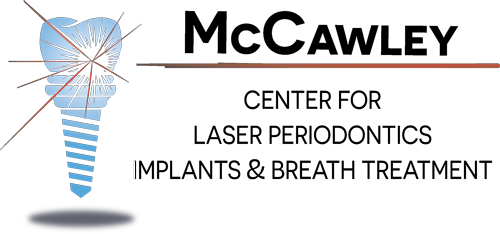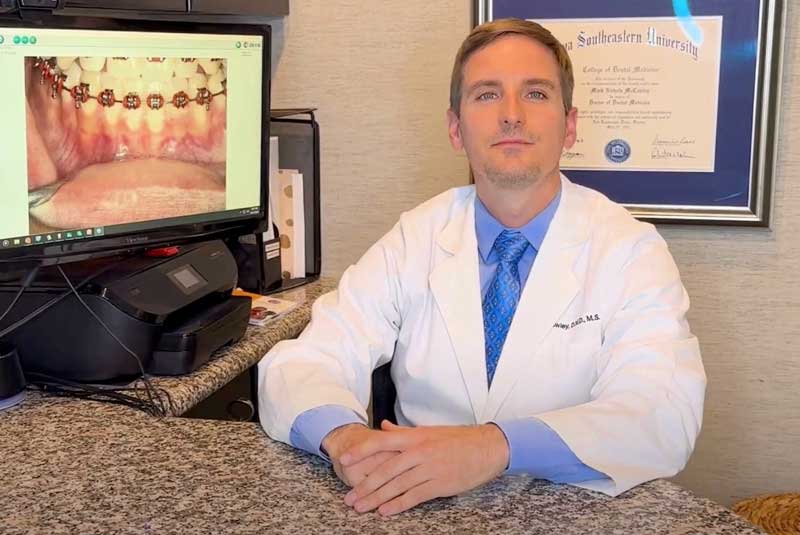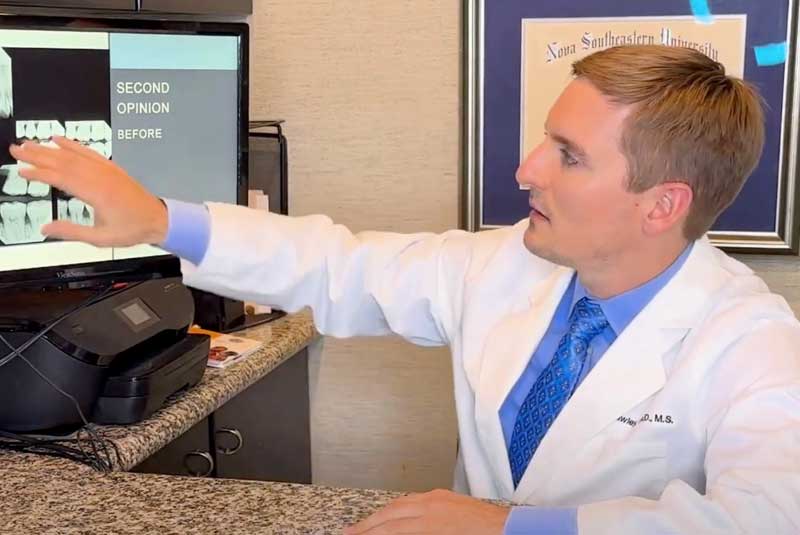| ✅ Reviewed by Dr. Tom McCawley | 🕒 Reading time: four minutes |
Dental implants are one of the most reliable ways to replace missing teeth, but like natural teeth, they are not immune to problems. While implants boast a success rate of over 95%, infections, bone loss, or mechanical issues can sometimes compromise their stability. Recognizing the early warning signs of a failing implant is essential. With timely care, many implants can be saved.
At the McCawley Center for Laser Periodontics & Implants, we specialize in diagnosing and treating implant complications, including peri-implantitis, using advanced laser therapy such as the LAPIP® protocol. Here are seven red flags you should never ignore.
1. Persistent Pain or Discomfort
Mild soreness is normal after implant surgery, but ongoing or increasing pain months or years later is not. Pain can signal infection, bone loss, or implant instability. If your discomfort does not improve, it is time to schedule an exam.
2. Swelling, Redness, or Bleeding
Healthy gum tissue around an implant should look firm and pink. Swelling, redness, or bleeding when brushing may indicate peri-implantitis, a bacterial infection similar to gum disease that threatens the surrounding bone.
3. A Loose or “Wobbly” Feeling
A properly integrated implant feels as stable as a natural tooth. Any sensation of looseness is a serious warning sign that the implant is no longer properly anchored in the bone. This can happen from untreated gum disease, poor bone density, or ongoing infection.
4. Gum Recession Around the Implant
If the gums start to pull back, the implant post or abutment may become visible. Recession not only affects appearance but also exposes the implant to bacteria, making it more vulnerable to infection.
5. Pus, Discharge, or a Foul Odor
Pus or a persistent bad taste and smell often point to infection. Just like gum disease around natural teeth, these symptoms suggest that bacteria are destroying the supporting tissues around your implant.
6. Difficulty Chewing or Bite Changes
If your implant feels uncomfortable when biting down, or if your teeth suddenly feel misaligned, it could mean the implant is shifting. This is often an early indicator of bone loss or mechanical failure.
7. Radiating Pain, Numbness, or Pressure
Unusual sensations such as tingling, numbness, or sharp pain in the jaw, lips, or gums may mean the implant is pressing on nerves or has been placed in an unstable area of bone. This requires immediate evaluation.
Early vs. Late Implant Failure
Not all implant problems happen for the same reason or at the same time. Understanding the difference between early and late failure helps patients know what to expect and why quick attention is so important.
Early failure occurs shortly after placement, often due to poor healing, infection, or inadequate bone density. Late failure can develop years later, commonly from peri-implantitis, chronic stress on the implant, or untreated gum disease. In both cases, waiting too long makes treatment more difficult.
| When to Seek Immediate Care If you notice swelling, pus, looseness, or pain that does not improve within a few days, do not wait and see. Early intervention may allow us to save the implant with minimally invasive treatments such as LAPIP® laser therapy, antimicrobial care, or bone grafting. Left untreated, the implant may need to be removed. |
How We Can Help
As pioneers in laser dentistry, our team offers advanced solutions for failing implants:
- LAPIP® Laser Treatment: Removes infected tissue, disinfects the implant surface, and stimulates bone regeneration, all without cutting or stitches.
- Bacteria-Focused Diagnostics: We use microscopic and culture testing to identify the exact infection source.
- Comprehensive Implant Expertise: We specialize in saving implants that other offices may consider hopeless.
Take Action Before It’s Too Late
Dental implant problems will not resolve on their own. If you are experiencing any of the warning signs above, the sooner you seek care, the greater the chance your implant can be preserved.
Schedule your consultation at the McCawley Center for Laser Periodontics & Implants in Fort Lauderdale today. Our experienced team can assess your implant, provide immediate solutions, and protect your long-term oral health.
To book an appointment at our periodontal office in Fort Lauderdale, FL, call (954) 807-4829 or visit us at 800 East Broward Blvd #706 Fort Lauderdale, FL.
FAQs
With advanced laser therapy (LAPIP®), many infected implants can be stabilized and preserved for years.
The most common causes include peri-implantitis (gum infection around the implant), insufficient bone density, smoking, uncontrolled diabetes, or excessive stress on the implant.
In severe cases, the implant may need to be extracted. After bone grafting and healing, a new implant can often be placed successfully.











